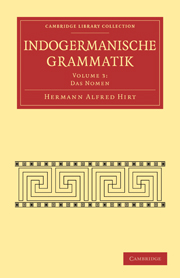Book contents
- Frontmatter
- Vorwort
- Contents
- Einleitung
- I Die Interjektionen
- II Die Partikeln
- III Die Fürwörter. Pronomina
- IV Das Nomen und seine Flexiou
- V Suffix- und Kasusbildung. Die Determinativa
- VI Die Entstehung der Flexion
- VII Die Sufflxbildung. Suffixe aus selbständigen Worten und sonstige Suffixe
- VIII Suffixe durch falsche Abstraktion
- IX Die Wurzeldeterminativa
- X Die Adjektiva
- XI Die Steigerung
- XII Die Adverbia
- XII Die Zahlwörter
- XIV Das grammatische Geschlecht
- Autorenverzeichnis
- Sachverzeichnis
- Wörterverzeichnis
- Berichtigungen
XII - Die Adverbia
Published online by Cambridge University Press: 29 August 2010
- Frontmatter
- Vorwort
- Contents
- Einleitung
- I Die Interjektionen
- II Die Partikeln
- III Die Fürwörter. Pronomina
- IV Das Nomen und seine Flexiou
- V Suffix- und Kasusbildung. Die Determinativa
- VI Die Entstehung der Flexion
- VII Die Sufflxbildung. Suffixe aus selbständigen Worten und sonstige Suffixe
- VIII Suffixe durch falsche Abstraktion
- IX Die Wurzeldeterminativa
- X Die Adjektiva
- XI Die Steigerung
- XII Die Adverbia
- XII Die Zahlwörter
- XIV Das grammatische Geschlecht
- Autorenverzeichnis
- Sachverzeichnis
- Wörterverzeichnis
- Berichtigungen
Summary
211. Allgemeines. Der Ausdruck Adverbium ist aus dem gr. ἐπίρρημα übersetzt, und es bezeichnet eigentlich das dazu Gesprochene. Adverbien sind nicht flektierbare Satzteile, die zu einem Verb, Adjektiv oder auch zu einem Substantiv (gr. ὁ νῦν χρόνοζ ‘die Zeit jetzt’, ὁ πρότ∈ροζ βασιλ∈ύζ ‘der frühere König) hinzutreten, um sie näher zu bestimmen.
Was ihre Herkunft betrifft, so sind, seitdem eine Flexion besteht, zahlreiche flektierte Formen zu Adverbien erstarrt, und dieser Vorgang wird sich immer wiederholen. Aber der Zeit der Flexion ging eine Zeit voran, die die Flexion, soweit wir sehen, nicht kannte, und auch aus dieser Zeit sind zahlreiche Adverbien und adverbiale Elemente in den ältesten Zeiten der Einzelsprachen vorhanden und selbst bis in unsere Zeit erhalten geblieben.
Wir haben oben gesehen, daß die flexivischen Elemente und die Determinative eng zusammengehören. Letztere treten auch bei den Adverbien auf, und daher erwecken viele Adverbia den Eindruck eines Kasus, ohne es zu sein. Man ist aber bisher ziemlich allgemein in den Irrtum verfallen, in all den Fällen, in denen die Adverbien Ausgänge zeigen, die beim Nomen als Kasusendungen vorkommen, in den Adverbien erstarrte Kasus zu sehen. Namentlich wo Adjektive neben Adverbien stehen, hält man das Adverbium für jünger.
Wenn man aber den Tatbestand genau beobachtet, so sieht man das Irrige dieser Annaheme in manchen Fällen leicht ein.
So steht bei Boisacq: πρότ∈ροζ, aw. fratara- ‘der vorher gehende’, ai. pratarάm adv. ‘entfernter’.
In Wirklichkeit ist auch im Gr. πρότ∈ρον älter als πρότ∈ροζ, und der Artikel müßte lauten gr. πρότ∈ρον ai. prάtaram adv. usw.
- Type
- Chapter
- Information
- Indogermanische Grammatik , pp. 294 - 306Publisher: Cambridge University PressPrint publication year: 2009First published in: 1927



